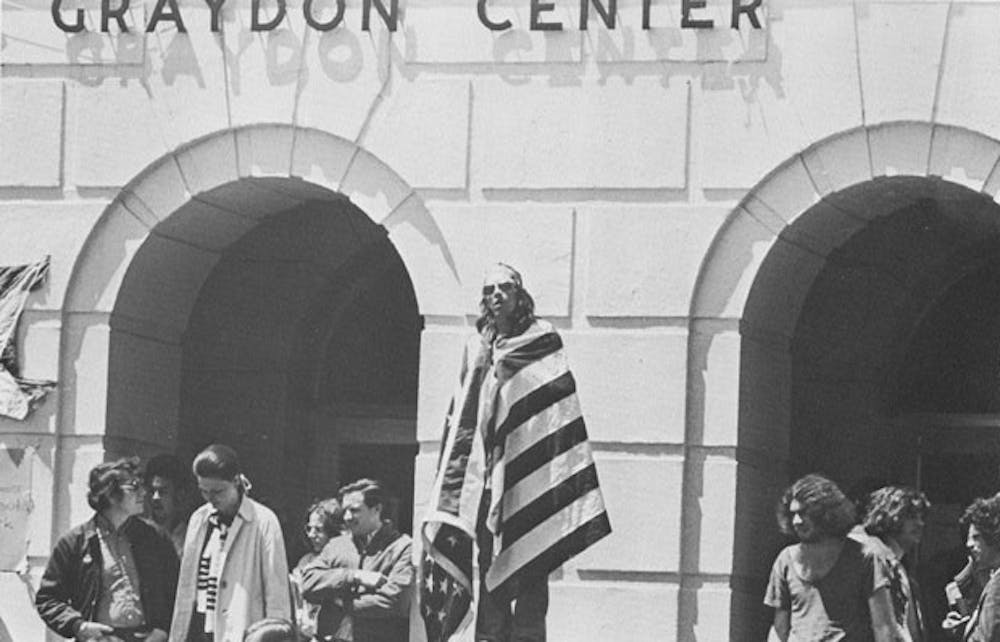Here’s the scene: It’s May in D.C., the year 1968. Women in short dresses twirl in circles around the flowers on the Main Quad. Men with square glasses slouch on the sidelines, running fingers through their long hair. There’s tension in the spring air — murmurs about revolution and policy changes on campus — but this is a weekend of festivities and celebration.
The Annual Spring Queen reigns over all of this with two unlikely collaborators: the ugliest man and professor on campus.
It may sound surprising to our ears, trained as they have become to the politically correct rhetoric of the day, but from 1958 until sometime in the early 1970s (records from this era are sometimes incomplete), AU students elected The Ugly Man, and some years, The Ugly Professor too.
“It was crazy,” said former President of Phi Sigma Kappa and 1960 AU Ugly Man of the year, Bill Eggenschiller.
Each year, campus organizations and individuals submitted their nominations to the AU service fraternity, Alpha Phi Omega. Students then put pennies in the jars of the students and professors they felt deserved the title. At the end of the competition the money collected went to one of several charity ventures. For example, in 1971, the APO chapters at Howard University, Georgetown University, George Washington University and AU teamed up to raise $1,000 for underprivileged orphans in Honduras.
Part of AU’s contribution to the fund — as well as Georgetown’s — came from the Ugly Man and Ugly Professor competition.
Eggenschiller said the contest itself reflected a student’s popularity.
“It had nothing to do with looks,” Eggenschiller said. “It had to do with how much support you got.”
School of International Service professor and AU alumnus Gary Weaver confirmed Eggenschiller’s statement that the contest reflected little on the winner’s appearance — perhaps because Weaver won the title of Ugly Professor himself one year.
“Ugly Professor meant most popular,” Weaver explained. “Nobody really voted for somebody because they thought they were ugly — I hope.”
An editorial that ran in The Eagle in Feb. 1968 would seem to support Weaver’s claim to popularity — it called him “one of the few people in SIS able to work with students, to understand them and to help them when they needed help.”
In addition to his impressive teaching career at AU, Weaver earned his bachelor’s, master’s and doctorate here. At one point during his studies at AU, Weaver served as president of APO. The organization was a fraternity dedicated to service rather than social commitments, according to Weaver, who also said he did away with hazing during his time as president.
“Alpha Phi Omega had a reputation for doing work in the community and for charity and so forth, so [the Ugly Man Contest] was a way to promote service on the campus,” Weaver said. “Everybody knew what it meant: it was Alpha Phi Omega again trying to do good somewhere.”
Proceeds from the contest often served to aid people in other nations, but in the late ‘60s and early ‘70s, conflicts at home emerged as more demanding of students’ attention, Weaver said.
“Everybody got so involved in the anti-war movement, the civil rights movement and that sort of thing that [APO] was no longer attractive to a lot of activist students who wanted to be more radically activist than being a part of this service organization.”
Nonviolent conflict erupted on campus when students demanding greater involvement with governance of the university “took over a number of buildings — the administration building, the Ward Circle building — and put a big banner on the front of the Mary Graydon Center that read ‘A New AU,’ which is ironic because this is the slogan for the [most recent AU fundraising campaign], but the new AU was really invented by a group of hippies way back in [1969],” Weaver said.
Both Weaver’s ruminations and the yearbooks from that era paint a picture of a campus in revolution: stone-faced police mixed with students in Ward Circle, class officers posing wrapped in little more than the American flag, a sign reading “ABSOLUTELY NO TEAR-GAS VICTIMS ALLOWED IN MGC.”
“Every day, it was kind of a routine,” Weaver said. “[AU] got tear-gassed around 2 or 3 o’clock in the afternoon.”
Amid the atmosphere of turmoil that accompanied the ‘70s at AU, APO lost its charter and the Ugly Man Contest disappeared.
The service fraternity reorganized as a new chapter separate from the old in 1998, according to current APO President and Eagle Staff Writer Howie Perlman.
Though Perlman mentioned no intentions to revive the Ugly Man competition, he did say APO continues to integrate fun and service, as the fraternity did in the ‘60s.
APO’s participation in the Making Strides Walk for breast cancer awareness and fundraising on Oct. 31 is one example of this fun-service combination, according to Perlman.
“We will have a good deal of fun fighting this horror together,” Perlman said.
You can reach this staff writer at sparnass@theeagleonline.com.





